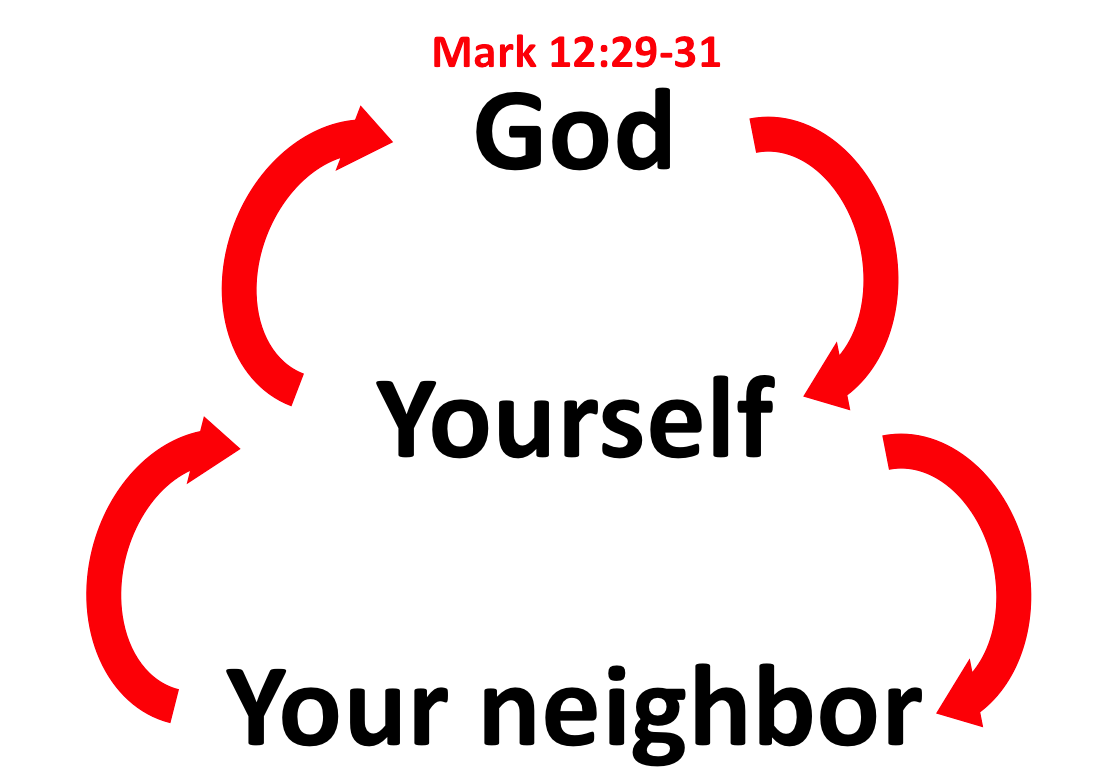“29 The first of all the commandments is: ‘Hear, O Israel, the Lord our God, the Lord is one. 30 And you shall love the Lord your God with all your heart, with all your soul, with all your mind, and with all your strength.’ This is the first commandment. 31 And the second, like it, is this: ‘You shall love your neighbor as yourself.’ There is no other commandment greater than these.” Mark 12:29-31
We see in Mark 12 rising tensions between Jesus and the religious leaders of Israel. After Jesus told a parable of the wicked vinedressers to show how evil Israel’s current leaders were (12:1-12), the religious leaders attacked His teaching three times in an attempt to destroy His credibility and popularity (12:13-34). They first questioned Him about the poll tax (12:13-17), the resurrection (12:18-27), and then the greatest commandment (12:28-34).
When a scribe asked Jesus “which is the first (foremost) commandment?” of the 613 commands in the Mosaic Law (12:28), I was deeply touched by Jesus’ response. Christ focused on cultivating a love relationship with God, ourselves, and others. He said, “Hear, O Israel, the Lord our God, the Lord is one” (12:29). The word “hear” means to listen or pay attention. God is saying to us, “Stop what you are doing and hear what I have to say to you!” This love relationship begins with listening to what God has to say.
Some of us are so busy with life we do not know what it means to be still and hear what God has to say to us in His Word. We cannot cultivate a love relationship with anyone if we do not take time to listen to them. This is true in our marriages, families, friendships, and especially in our relationship with the Lord. When was the last time you asked the Lord what He wanted to say to you? God will not force His way in to our lives. He waits for an invitation to come to us and speak to us (cf. James 4:8). We cannot love God if we do not receive His love for us first. “We love Him because He first loved us” (I John 4:19). We cannot give what we do not possess.
In verse 29, Jesus quoted from Deuteronomy 6:4 when Moses was preparing the next generation of Israelites to enter the Promised Land. The Triune God of Israel (“Us” – Gen. 1:26: Father, Deut. 32:6; Son, Psalm 2:6-7; Spirit, Gen. 1:2) is “one” in essence unlike the polytheistic pagan gods of Canaan. Or another translation of verse 29 reads, “The Lord is our God, the Lord alone is the only one.” The Lord God of Israel was to be the sole object of Israel’s worship and love.
When we have received (“hear”) God’s love for us, we can then love Him with all our “heart” (emotions), all our “soul” (self-conscious thought life), all our “mind” (thoughts), and with all our “strength” (energy). The Lord is worthy of receiving the very best that we have to give to Him. If someone or something other than God is receiving our very best, then we have set up an idol in place of God.
Jesus does not stop here. The scribe had asked for the greatest “commandment,” but Jesus gives him a “second” commandment which flows from the first. “You shall love your neighbor as yourself” (12:31; Leviticus 19:18). The word “neighbor” (plesion) refers to “one nearby.” Our neighbor could be our spouse, children, someone living next door or across the street, a coworker sitting across the aisle, a friend, a church member, etc. What is the standard by which we are to love our “neighbor”? We are to love him or her as we love ourselves.
I have heard sermons on this verse which say it is selfish or sinful to love yourself. But is it sinful to obey Christ’s command here which assumes that you love yourself? Why would Jesus say to love your neighbor as yourself if it is wrong to love yourself? Why would the New Testament quote this verse (cf. Matthew 19:19; 22:39; Mark 12:31; Luke 10:27; Romans 13:9; Galatians 5:14; James 2:8) originally found in Leviticus 19:18 more than any other Old Testament verse if it is wrong to love yourself! This makes no sense!
I would propose that many Christians love their neighbor more than they love themselves. For example, do you talk to your neighbor the way you to talk to yourself when you make a mistake? You might say to yourself, “you can’t do anything right” or “you are such an idiot” when you spill the milk at the table or lock your keys in the car. But would you say that to your neighbor? Not likely. Why do we treat ourselves which such contempt? Whose voice is this that berates us? You might say it is the voice of a perfectionistic parent or preacher. But I think Jesus would say it is the voice of the evil one (cf. Ephes. 6:12; Rev. 12:9-10) who inserts these shame-based lies into our brains when we are wounded by a parent or preacher or some other authority figure.
Some Christian leaders refer to Jesus’ discipleship teachings to promote self-hatred or abuse. When Jesus said, “If anyone desires to come after Me, let him deny himself, and take up his cross daily, and follow Me” (Luke 9:23), I have heard some believers teach that self denial means to deny yourself the kindness and love Christ wants you to show to others. But “what” is it Jesus wants us to deny ourselves that keeps us from following Him? I believe one thing that keeps us from following Jesus are shame-based lies that say, “Jesus could never love you for who you are” or “you are not worthy to follow Jesus.” Like Jesus, we are to “despise the shame” (Heb. 12:2) that keeps us from enduring the cross we are to bear in our own lives for the Lord.
The command “love your neighbor as yourself” assumes that we love ourselves. Isn’t this what the apostle Paul taught when he wrote, “So husbands ought to love their own wives as their own bodies; he who loves his wife loves himself. For one one ever hated his own flesh, but nourishes and cherishes it, just as the Lord does the church” (Ephes. 5:28-29)!?! Look at what God is saying to us. No human being in his right mind “hated his own flesh.” Instead he “nourishes and cherishes it.” According to what standard? “As the Lord does the church.” We are to “nourish” (ektrephō = bring up to maturity) and “cherish” (thalpō = warm someone up by nurturing or tenderly caring for them) ourselves just as Christ nourishes and tenderly cares for His church.
When we neglect and/or condemn ourselves, we are failing to reflect Christ’s love for us as members of His church. The purpose of Christ’s love is to purify us and make us more like Him (Ephes. 5:25-27). So if I am loving myself as Christ loves the church, I am becoming more like Jesus Christ. If I am loving my neighbor as myself, I am helping them also to become more like the Savior.
In the diagram above, we see then that cultivating a love relationship with God begins with receiving (“hear”) His love for us so that it will flow over to others. As we receive His love, we learn to nourish and cherish ourselves as He does so we can become more like Him (I John 4:19). So living under God’s love and grace promotes growth (Rom. 6 & 8). Living under the Law or self-hatred, promotes defeat and death (Rom. 7). When we love ourselves Christ’s way, we can then love others with the love He has freely and unconditionally given to us to help them become more like Him (I John 4:20-21).
Conclusion: Is it selfish or sinful to love ourselves? Absolutely not because God commands us to love our neighbor as ourselves. This involves receiving God’s love for us so we can nourish and cherish ourselves in a way that helps us to become more like Jesus. As we become more Christlike, we can then help others to do the same.
Prayer: Lord God, forgive me for being too busy to stop and listen to what You have to say to me. Sometimes I think I stay busy because I am so afraid to slow down and feel. Thank You for loving me even though I have turned to other things and/or people in my search for Your love. Right now I invite You to speak to me with Your voice of love and truth. Please replace the lies that keep me closed off from You with the truth that opens my whole being to You and Your love for me. I am totally loved by You, Lord Jesus. This warms and nurtures my soul. Forgive me for failing to love myself with Your love. So often I feel like a baby Christian because I have neglected to nourish and cherish myself as You have nourished and cherished me. Please show me how to love myself with Your love so I may love You above all else and my neighbor more fully so they along with me, may become more like You. In Jesus’ name. Amen.




